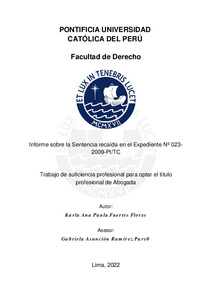Informe sobre la Sentencia recaída en el Expediente Nº 023-2009-PI/TC
Abstract
En el presente informe jurídico se analiza la Sentencia del Tribunal Constitucional Nº 0023-2009-PI/TC que corresponde a la Acción de Inconstitucionalidad planteada por el Señor Gonzalo Tuanamá Tuanamá, en representación de 5000 ciudadanos contra el Decreto Legislativo Nº 1079, que establecemedidas que garanticen el patrimonio de las Áreas Naturales Protegidas.
Es por ello que se analizará la importancia, creación, zonificación y procedimiento de aprobación de las Áreas Naturales Protegidas en el Perú, las competencias del Ministerio del Ambiente, específicamente el Servicio Nacional de Áreas Naturales Protegidas - SERNANP, para lograr el Estado cumpla con el mandato constitucional de preservación y uso sostenible de los recursos naturales.
A pesar de que, al momento de los hechos del presente caso, el ordenamiento peruano no contaba con la Ley de Consulta Previa, el Convenio Nº 169 de la Organización Internacional del Trabajo ya había entrado en vigor, por lo cual implicaba una serie de obligaciones para el Estado en la gestión de políticas públicas que involucren a los pueblos indígenas. En ese contexto, se evaluará como la obligación del Estado en materia ambiental se puede llevar a cabo sin afectar los derechos de los pueblos indígenas que se encuentren en dichas áreas protegidas. This legal report analyzes the Constitutional Tribunal's Decision Nº 0023-2009-PI/TC which corresponds to the Unconstitutionality Action filed by Mr. Gonzalo Tuanamá Tuanamá, on behalf of 5000 citizens against Legislative Decree Nº 1079, which establishes measures to guarantee the patrimony of Natural Protected Areas. Therefore, we will analyze the importance, creation, zoning and approval procedure of the Natural Protected Areas in Peru, the competencies of the Ministry of the Environment, specifically the National Service of Natural Protected Areas - SERNANP, and the disposition of natural resources to achieve the State's compliance with the constitutional mandate of preservation and sustainable use of natural resources. Despite the fact that, at the time of the facts of this case, the Peruvian legal system did not have the Prior Consultation Law, Convention No. 169 of the International Labor Organization had already entered into force, which implied a series of obligations for the State in the management of public policies involving indigenous peoples. In this context, we will evaluate how the State's obligation in environmental matters can be carried out without affecting the rights of the indigenous peoples located in these protected areas.
Temas
Protección ambiental--Perú
Derecho indígena--Jurisprudencia
Responsabilidad del Estado--Perú
Derecho indígena--Jurisprudencia
Responsabilidad del Estado--Perú
Para optar el título de
Abogado
Collections
The following license files are associated with this item:






